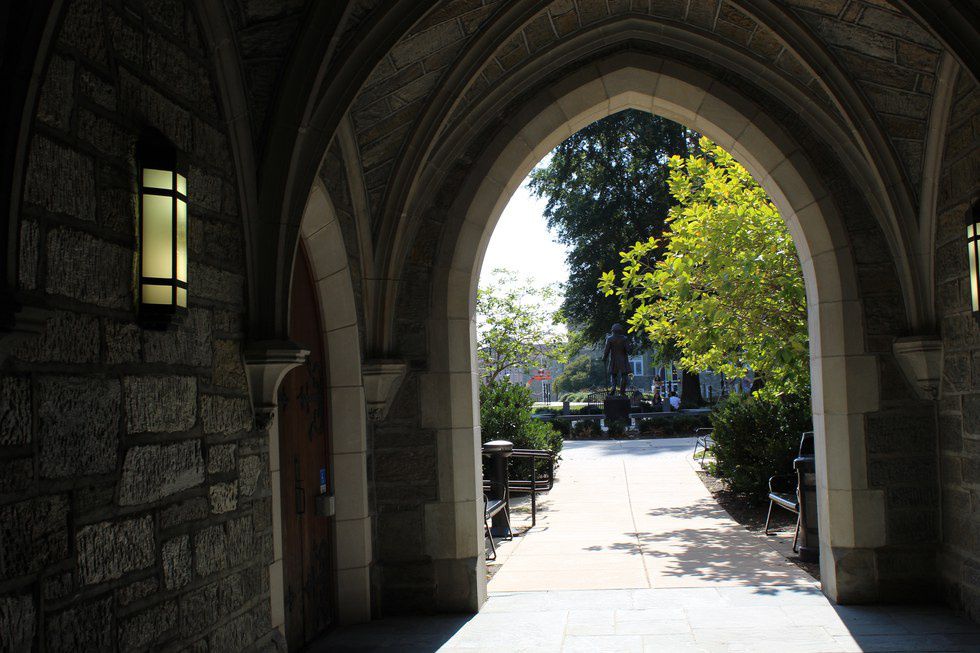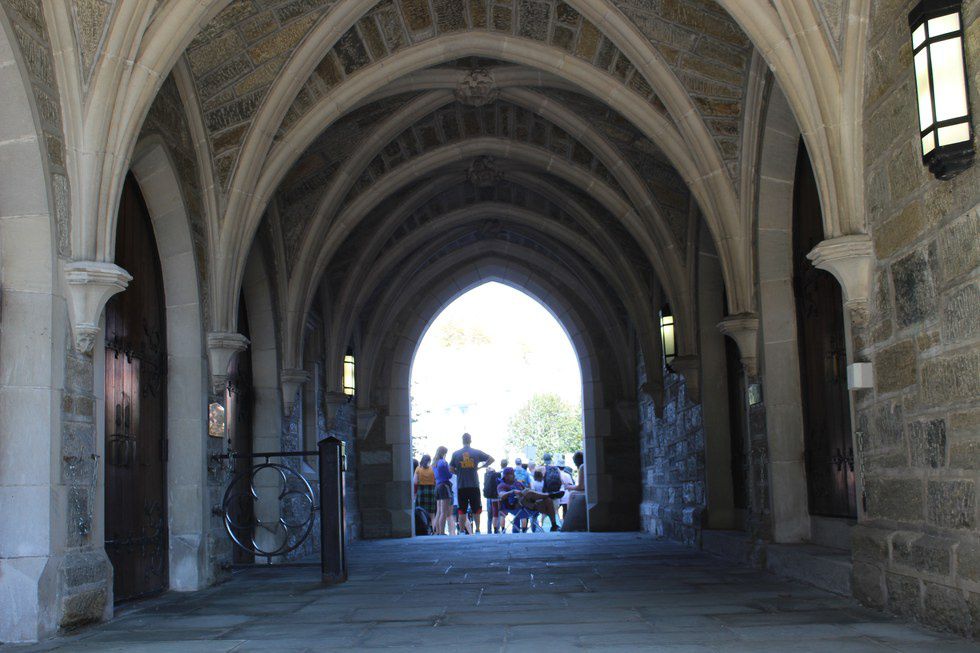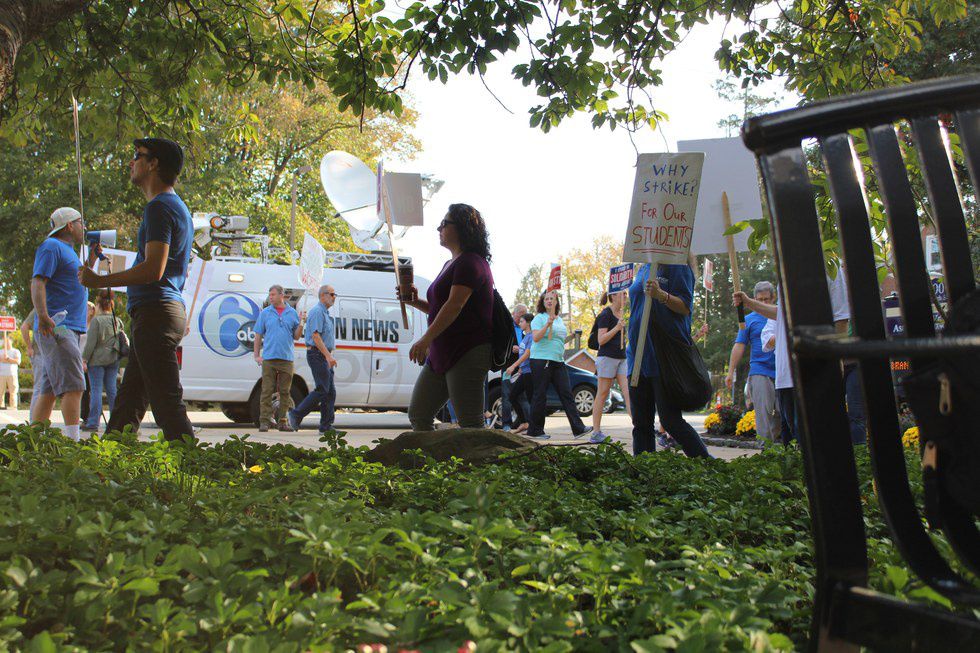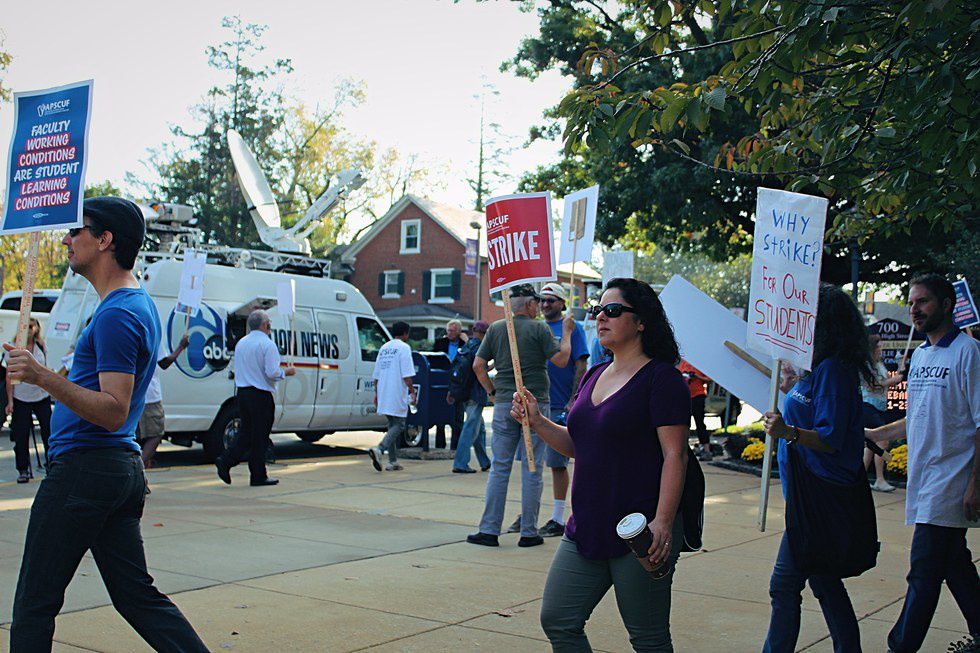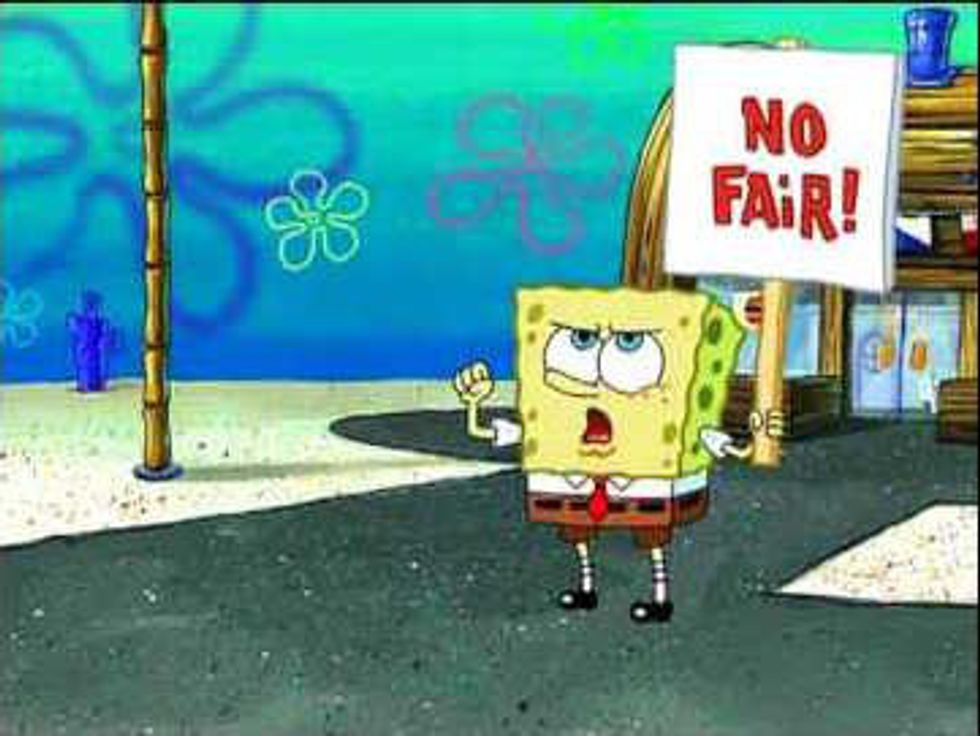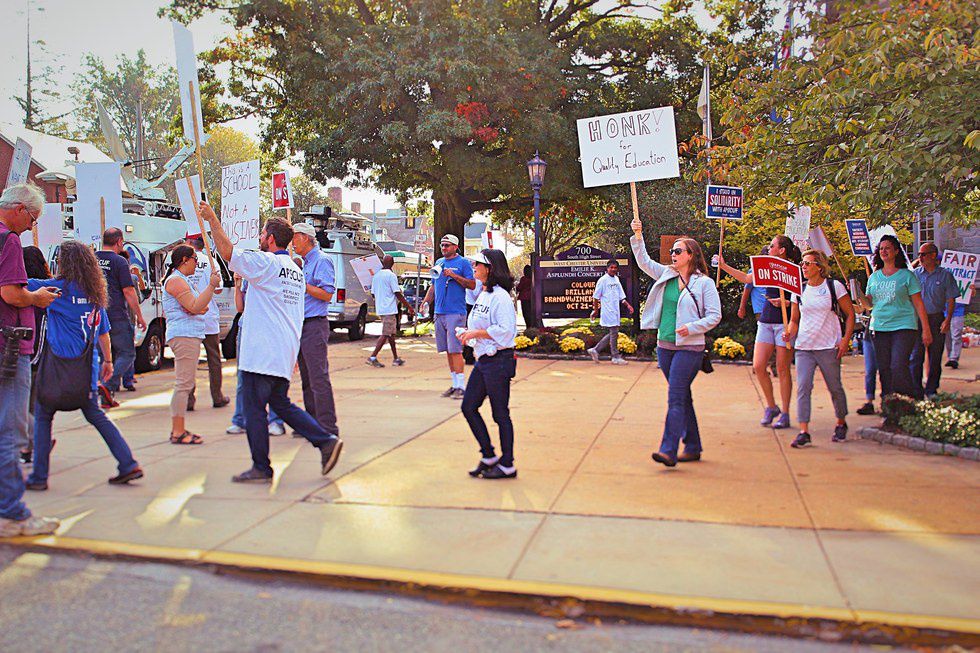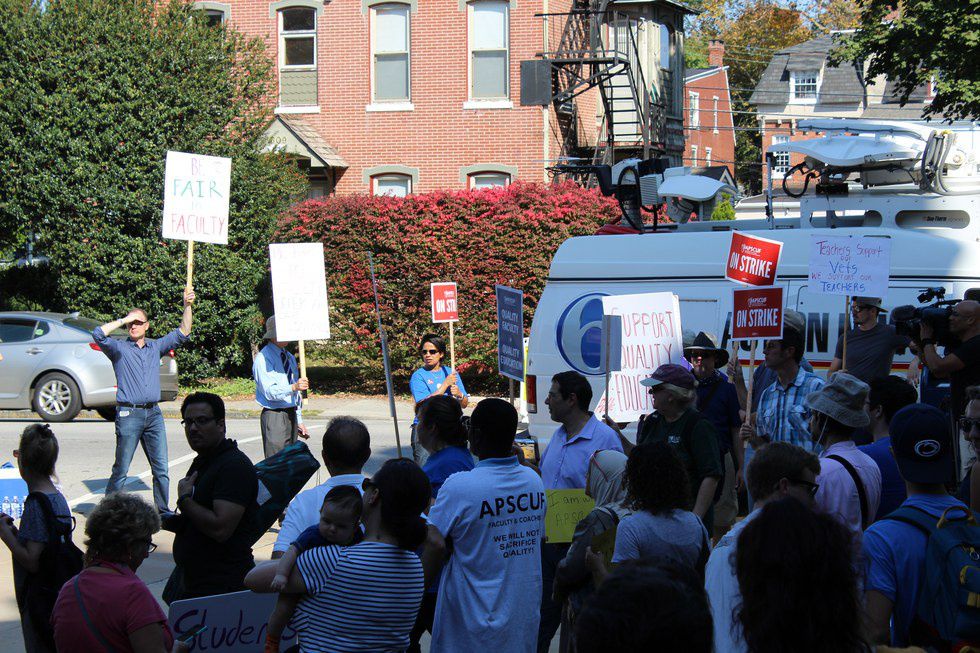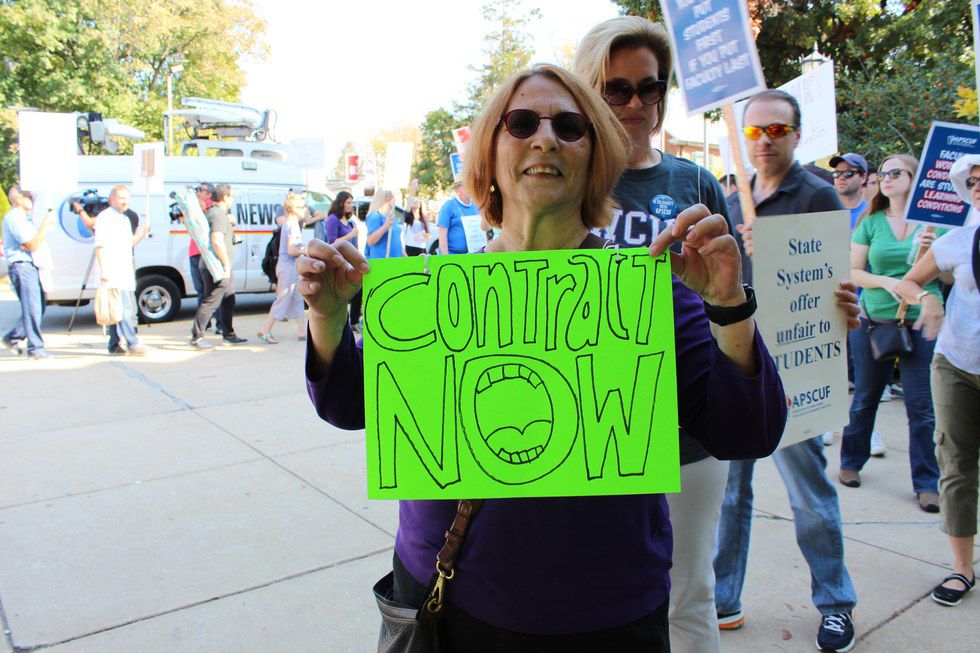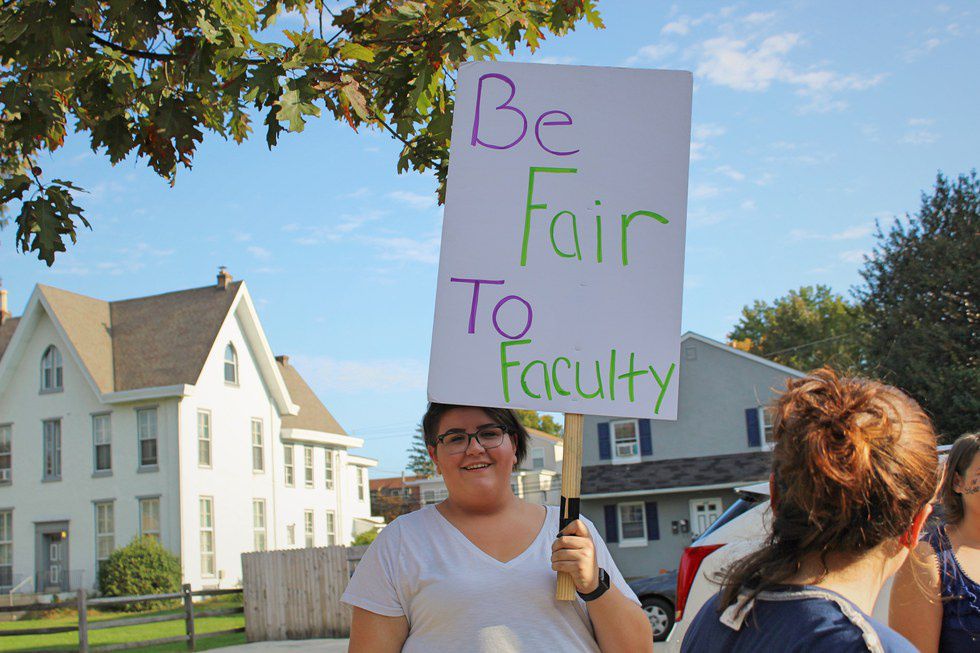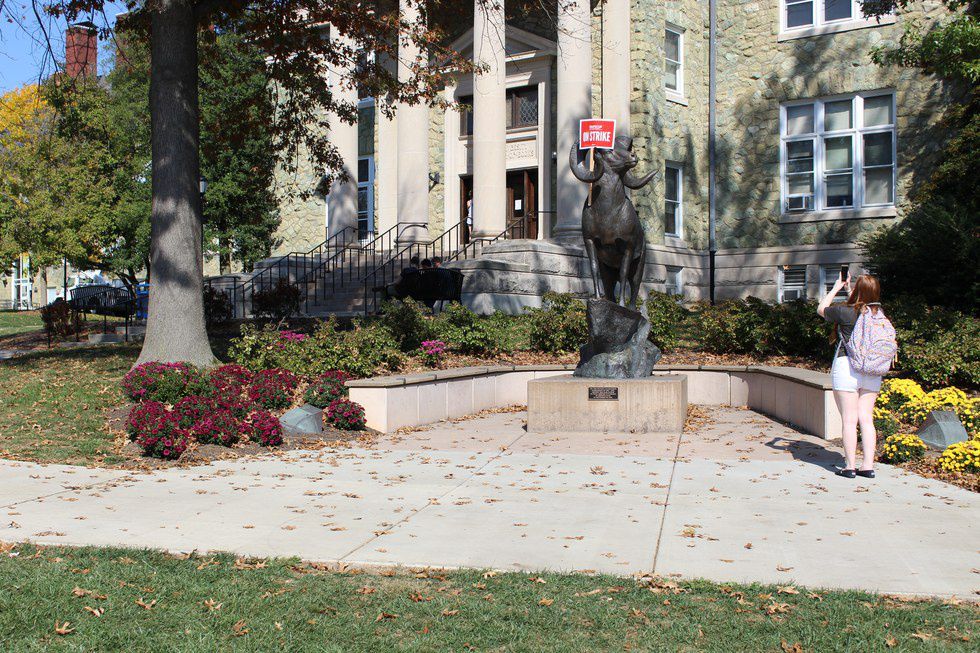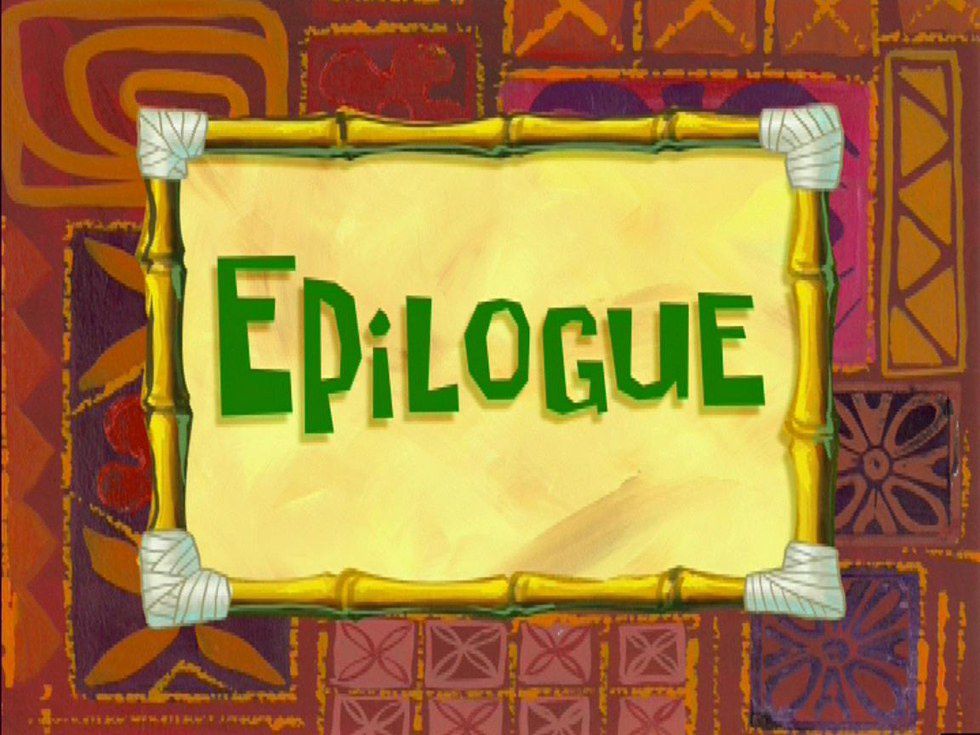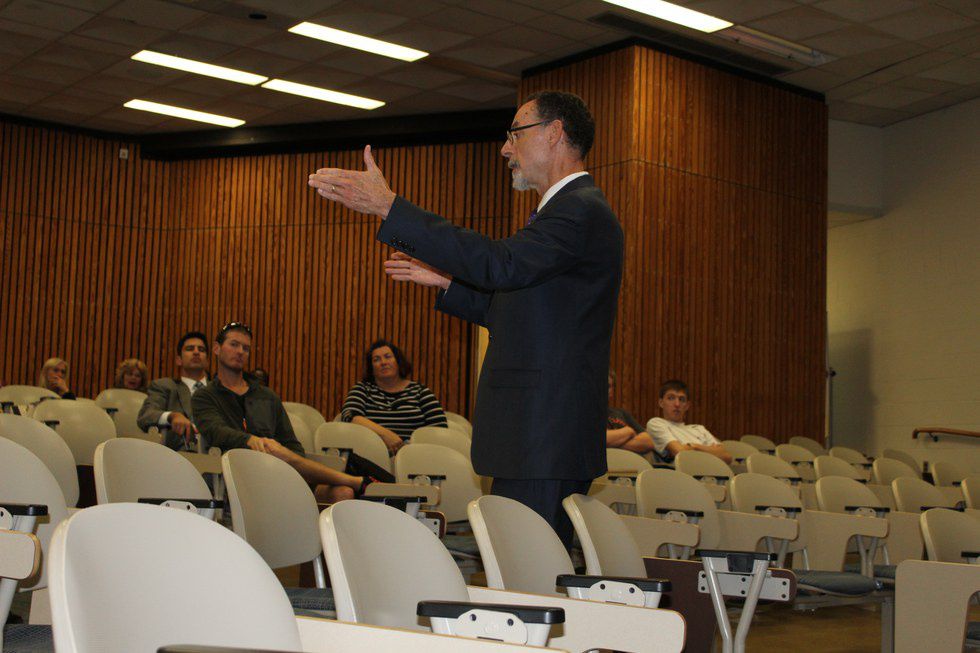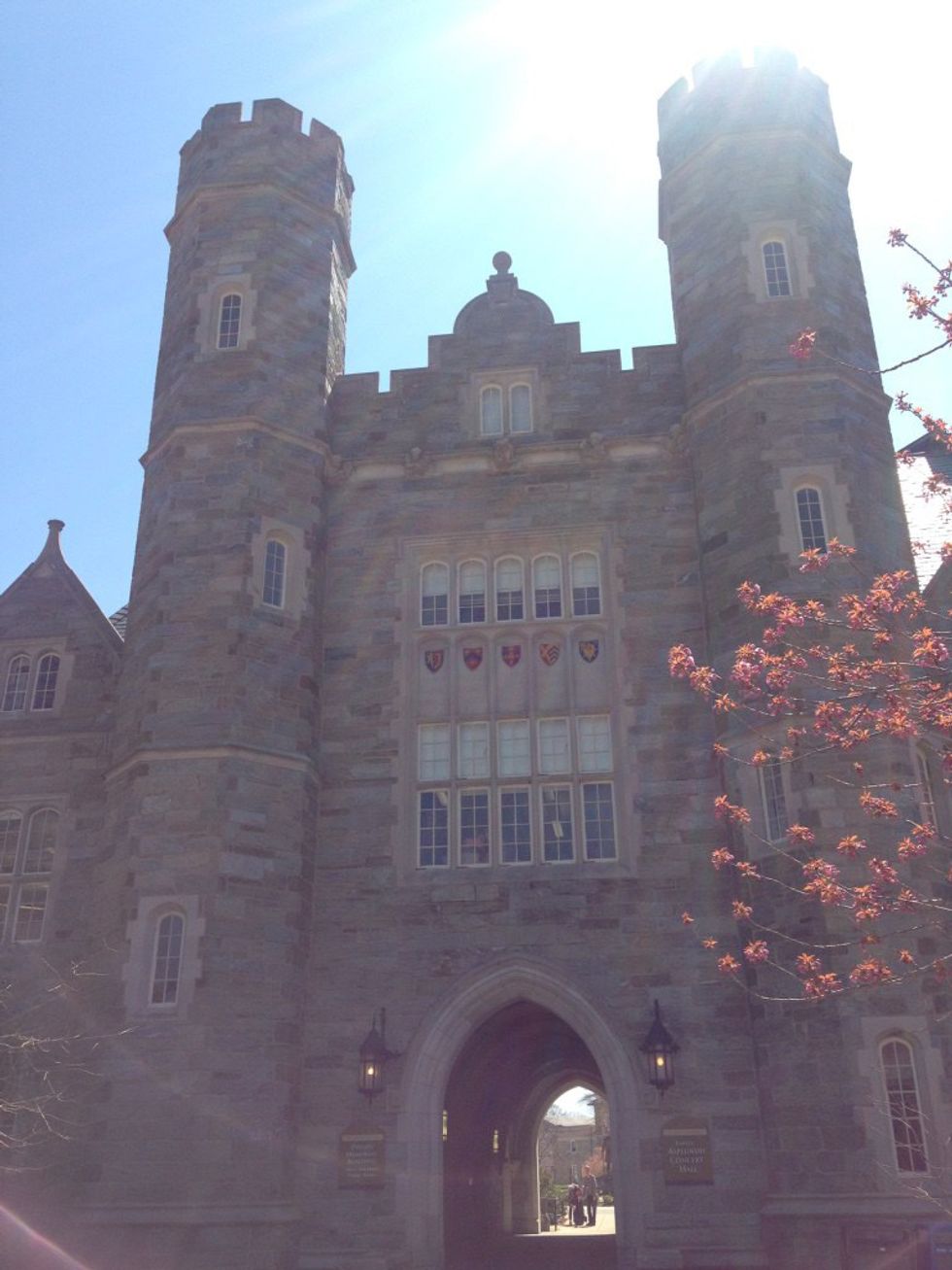Ever since the start of the 2016 Fall Semester, students attending Pennsylvania State colleges have been getting subtle hints from faculty about an unlikely chance that sometime in the near future there may be a possibility of a strike. This notion of a strike seemed to be played off as an extreme scenario, as in fact the historical events between the state and the union pointed to it not happening. Because the faculty either wasn’t, or appeared not to be taking the threat seriously- the students followed suit and didn’t seriously consider the potential of a strike at all. Life went on as normal, that is until Tuesday, October 18, when suddenly professors started acting peculiar; for the first time warning the students to keep vigilant because by the next morning their teachers might not be in class but rather marching out on the picket lines.
In the wee hours of Wednesday morning, some students were fortunate enough to get information from a professor indicating that the strike was on. No official evidence had yet surfaced otherwise. Word spread and the first students who tried to attend class discovered their professor’s intentions, thus verifying what we were all suspecting.
As I woke up to this new day I was filled with child-like curiosity; I sprang out of bed and grabbed my camera, excited to be able to document such a historic event first-hand. On my stroll over to the academic quad I mulled over the little information I knew regarding the current event in an attempt to form an opinion. Over the previous few days, the university had sent students a couple emails containing a link to a government website which was supposed to inform us on the developments of this ever-present issue. Unfortunately, most students felt the information was hard to piece together, and/or they used this fluid information as facts that they’d share with friends. All I really knew that morning, based on heresay, was if the faculty had their demands met then my tuition was likely to sky-rocket.
Feeling quite unattached to the situation, I arrived at the scene I observed the classic circle of frustrated proletariats marching and chanting while thrusting huge painted signs into the air. A news van was already resting on the scene; to the left was a small group of students holding supporting signs, and community members across the road with signs of support as well. I felt compelled to understand this. This was, after all, a very important thing that was transpiring… and admittedly I had no real idea who stood for what, or why. I approached the first person I could safely get to and asked her if she was faculty. To my good fortune, she turned out to be a chair of an academic department. At this time in the day I didn’t have any plan with my investigations aside from mere curiosity, so I can’t directly quote the professor I spoke with; but our interaction really got my mind turning. While on my trip back to my dorm I had a little time to digest the morning’s events. I came to realize there was more to this story than the university residents understood; I decided it was my responsibility to uncover the motives and consequences entailed so that everyone would be able to see this situation from the perspectives of those intimately effected, and not make judgments based solely on things “they’ve heard”.
I bounced around campus all day and was fortunate enough to talk to a lot of genuine people. The opinions and observations by each one of them became the DNA for the information I can now share with you. Let me introduce you to my main sources:
The six dedicated students who opened up about how they perceived the strike personally-
- Elise
a freshman in the Psychology program, but also is minoring in Criminal Justice. She plans on working for a government agency as a Criminal Psychologist. - Alexa
a Junior studying Pharmaceutical Product Development; post-graduation she plans on attending pharmacy school to further her studies. - Katie
also in her Junior year under the major of Pharmaceutical Product Development, and would like to work in the business side of the pharmaceutical industry. - Nicholas
a first year Economic Finance Major. - Russell
studying Criminal Justice as a freshman with the goal of becoming a New Jersey State Trooper and eventually going on to work in Homeland Security. - Andre
a freshman currently studying Forensic Chemistry & Toxicology.
The three faculty staff I was privileged to meet in the midst of their active striking-
- Dr. Susan Johnston
also a Physician’s Assistant, previously taught at Hahnemann Medical College- which later became what you know to be Drexel University. She has worked the last 18 years at West Chester University as a professor, and currently is serving as the chair of the Anthropology & Sociology Department. - Mrs. Mame Purce
a tenured Librarian at WCU since 2006. Prior to her position here she worked at both Delphi and Hofstra Universities, as well as public libraries for the majority of her career prior to her time here with the Golden Rams. - Dr. Ed Lordan
professor of Communication Studies, is serving as the Spokesperson for the APSCUF union. Previous to his 15-year career at WCUPA he taught at Temple and Villanova Universities, and was in the graduating class of 1979 from West Chester University with an English Major.
The only non-striking faculty member I was able to hunt down that day-
- Dr. Giovanni Casotti
a professor at West Chester for 21 years, and currently is chairman of the Biology department. He got all of his post-secondary education, including his PhD, in Australia before serving his Post-Doctrine Fellowship at the University of Arizona in Tucson.
I want to take a moment to sincerely thank these people for being brave enough to speak honestly about this topic shrouded in misunderstanding. We will now have a new insight into this important event, and be able to use this new information for more clarity and in making our own informed opinions.
*As a disclaimer all of the information provided in this article is by first-hand accounts only, none of this information has been given by the actual parties negotiating in Harrisburg. I attempted to communicate with the APSCUF faculty union and the PA State Department for Higher Education, but neither allowed me the opportunity to talk to a representative or spokesperson. *Also please note that the information and opinions collected from students and faculty are personal opinions to these specific people and do not represent the entire population/specific gender’s views, opinions or experiences.
**************
Student perspectives on the strike surprisingly followed a pattern; the male students were more concerned about the direct effect on themselves, versus the female students who had a wider concern for the effects on multiple types of people. When asked if they were for or against the strike the male students all agreed they were against it to one degree or another. Male students considered the teachers who went on strike to be selfish as it was their job to teach students, and now with the strike they’d be wasting time and money. Andre continued on to add that he felt “it is hindering [our] experience here”. Inversely, the female students all believed in the strike; as they felt teachers deserve better pay and benefits because they do so much for the students. The females commented on how much we truly rely on teachers for education. They also talked about the state acting unfairly toward the faculty by not even being willing to negotiate- leaving the faculty to work without a contract for well over 400 days.
After the students gave me their view on the strike with confidence, I asked them if they knew why the strike was even going on in the first place. The male students each acknowledged that the faculty was unhappy about their contract, but aside from that had a hard time assembling any hard facts. What I heard from the males seemed to only be a couple vague things “they’ve heard”, and in reality turned out to be inaccurate. The female students tried to answer with some rumors they took as truth, but I’d estimate only about 40% of what I heard could be considered true. All in all, the females admitted they really didn’t know the specifics, or much about the situation in general.
When asked how long they anticipated the strike to last, the males and females both agreed they were happy to have a day off but, were concerned of the possibility that the semester would be voided, and they would end up losing time and money. One person from each group also said they believed the strike would go on to last longer than anticipated, while the others didn’t indicate a specific idea.
Regarding missing classes, you would assume students would be thrilled! I was treated to discover quite the opposite, Russell summed up the student’s opinions best by saying: "[It’s] definitely different than high school, because in high school you want the classes to be canceled, but now it's our money that's on the line being wasted while we're sitting around doing nothing… so I don't really enjoy that.”.
As far as their opinion of professors who decided not to strike, both male and female students agreed that the opinions of others should respected, however the follow up explanations contrasted drastically. The male perspective was outlined by Nicholas’s answer: "[It's] their personal decision. I mean, they obviously like teaching and they're here for the love of teaching, so, it's up to them. I like it because they're not just here for like, the money I guess." Each male believed that because the faculty wasn’t striking, they cared more about the student and less about money- which impressed them. The males also believed by negating the picket lines the faculty were proving just how dedicated they were to their jobs. Elise noted that if she were to be in such a professor’s shoes, with a differing opinion or unique situation, she wouldn’t want to be punished so neither should they. Other female students didn’t even realize there were faculty who refused to strike, simply assuming they all would end up striking due to peer pressure.
The common thread between all of the students is at the end of the conversation they stated they have so many questions about everything. The students just desperately wanted to be able to trust and depend on the university for information and support through this whole process; but instead felt on their own and left-behind. Not one of the students I encountered throughout the day felt they had a good grasp on what was going on; the lack of information was completely underwhelming. The students I met felt uneducated on why the teachers were striking and saw little to no real reason for the strike to occur at all- leading them to conclude that the strike is purely a burden to the student. Many students were even unsure if the faculty knew why they were striking. Alexa revealed (& what the other students clearly demonstrated) how informed she actually was; “I'm not really 100% sure. I would like to learn though! I feel like the university hasn't really told us that much about anything going on- so it's hard to have a good opinion when you're not really sure.” …” It doesn't seem like [the university] even tried to do anything whatsoever today- I mean, I haven't heard any updates, even [about] them negotiating- so, I don't know…”. She continued to explain the turbulence by saying, "I have lots of questions, like, what's going to happen? I feel like I still haven't officially heard things from the university, and that's very frustrating. I had to find out about the strike through Twitter, not even through the university itself, and that's not right.". Katie felt the same way and added, "Why isn't communication better between [the university and the students]? [T]he university is saying one thing and our teachers are saying completely opposite things. We woke up to an email from the university today, it says "Oh, negotiations happened…" and that's it; it was like two sentences. So, I went online and saw they were striking and I was like, "so… what do I do?””. Each of the students communicated this same experience with frustration in different ways, yet there were still a few students I met who indicated they didn’t have any strong feeling about anything going on- due to being uninformed.
Now that you have an idea of how the students tried to piece together information to come to terms with their situation, I’d like to share with you the views from inside the storm:
I made my rounds to the various striking locations, and each person I approached turned out to offer a unique view of the same beliefs. After I felt I understood their perspective, I went on a mission to find the elusive faculty who were rumored to have “crossed the line” and continued to teach. I went building to building, floor to floor, until I could find someone, usually a secretary, who could confirm if there were any professors in the facility. Finally, after a lengthy wild goose-chase I was able to find one.
The striking faculty and Dr. Casotti, the member who decided not to strike, all acknowledged the strike was happening because APSCUF union and the PA State Department for Higher Education wouldn’t settle on terms for a new contract. The professors explained that for almost two years the state hasn’t even attempted to work with them on addressing their needs. Dr. Lordan explained, “Our thinking was, if [change] didn't happen in the first 15 months…it's not going to happen in the next 15 months- so that was really the concern.".
Dr. Casotti understood they faculty was fighting back in this way because they wanted to keep the amount of guaranteed working time to stay the same each semester (which is directly correlated to their pay). He also nodded to a small pay, along with keeping healthcare premiums at their traditional rates. The striking faculty members also went on to list the following as reasons why they were fighting for a better contract: the students, preserving the quality of education, faculty equality, they felt they have been disrespected by the state for too long, wage increase, benefit stability, and control over the educational process.
The length of the strike was unknown to all, but as far as speculation goes the striking faculty were willing to stay out there as long as it would take in order to receive a fair contract from the state so they are able to maintain the level of education everyone expects from our school. Each striking member expressed they wanted the strike to end as soon as possible, Dr. Lordan stated "I would like for it to end while we're having this conversation", "I would like for [students] to get back to class". Upon further questioning he admitted that that wasn’t a realistic expectation, but realizes because of the immense pressure a strike puts on every part of the system there will have to be compromises made on both sides for this to finally end. Dr. Casotti hoped it would be no longer than 2-3 days so that class could resume on Monday. He continued to say that unless the two parties sit down and continue to negotiate, the strike would end up being prolonged.
The consequences of the teachers attaining their desired contract would result in preserving their ability to provide quality education for students, faculty across the board would be treated and paid equally (tenured and temporary adjuncts), the community of students and professors would be closer, this stressful time will finally end and students can get back to class, the representation of student education would be protected for the future because the university will still remain a respectable establishment with the higher standards it holds. Dr. Casotti discussed the new potential consequences of teachers winning the strike as being the union will feel more empowered, and in addition to that the state might now use the new budget as an excuse on why they “aren’t able” to fund other things the school needs. With that, the board of governors could choose to glean the needed funds by raising student tuition, “not to say they would, but they could.”.
The Faculty seems to believe that the threat to raise tuition and remove resources from the college is most likely just propaganda, but Dr. Lordan notes, “every year Pennsylvania tax payers put in a distribution that goes out to the 14 schools, and for a number of years in a row that number has gone down. So, invariably, if that number goes down that money's got to come from somewhere else.”.
When asked why he chose not to strike, Dr. Casotti had a number of reasons; for one, he has a class for 240 students who were scheduled to take a big exam that day, and he didn’t feel it would be fair for the student to have studied for weeks only to not be able to take the exam for several more weeks. Dr. Casotti outlines the life of the average student and how education in itself is expensive, so by not holding class while the student is still living here would make their living and eating expenses superfluous. The largest reason in his decision not to strike was the sheer fact that the union kept him (and the other faculty) in the dark on pretty much everything. The union wasn’t actively communicating to the faculty, nor did their website offer anything constructive… any information that finally trickled down to the faculty was extremely vague and unclear. He emphasized the importance of how he could not strike for something he was uninformed on. During the day of the strike he was finally able to find what he believed to be the current offer for a new contract through the universities website. After reading over the details he couldn’t say that it was an unfair offer. The new information only reinforced his decision not to strike. "It looks like most of the [things] in the existing contract have stayed intact- they haven't been touched. [T]he state wanted a lot more concessions, but I think they gave a lot back."…"It doesn't look like it's too bad a contract". He continued to suggest that maybe those who were currently striking may have been just as uninformed as he was, and that they might not have any idea of the new contract deal information that he had just found.
Dr. Casotti felt that the new offer was a pretty good deal, and he still believed that all professors regardless of employment status should be paid the same wages. Overall the striking faculty were extremely grateful for the media carrying their message to the public, and the support of the students really touched them. They want the students to know that they are the faculty’s number one priority in their motives. As Dr. Lordan shared with me, the union is 34 years old and in all those years not once have they had to strike. Many times the union authorized a strike, and that alone was enough to pressure the state into making deals with them. To me, that reveals a darker side of our State Department of Higher Education; the state fully understood the consequences a strike would bring, and even had plenty of time to resolve the issues before the deadline- yet chose not to even attempt to prevent it.
As I was finishing up this piece, around 5:00pm on October 21, I received the news that the strike is now over thanks to a tentative agreement. Class will resume per regular scheduling on Monday. For the first time we received an email from the president of the university with specific and helpful information, to which I’m sure everyone is relieved.
The president held a Q&A session yesterday in an attempt to open up communication between the university and the residents/ staff. It was a very welcome gesture and allowed communication to flow both ways in a constructive manner. I’m also starting to get emails from professors who are happy to be back to work. Myself, I’m now faced with finishing all the homework I forgot about in all the excitement, but what a welcome task it is. Mrs. Purce, one our Librarians, made a comment that really sums up the heart of our university: “I think that students realize that there's more to this campus than pretty buildings and partying- they're very serious about their school work, and they're very, very appreciative of what we do with and for them. It's been amazing.”
For insight on why the Faculty were striking watch my video!
https://www.theodysseyonline.com/strike-of-the-pa-...
All photos included in this article that are sourced to "Kylee S. Karschner" are owned by such and should not be used for any reason without the explicit written consent of said owner. Thank you.




